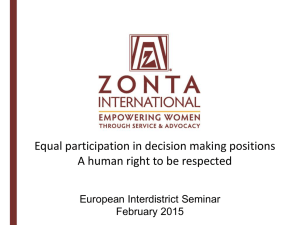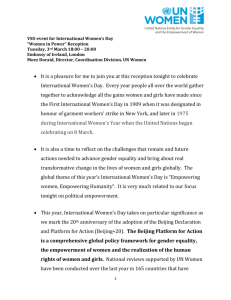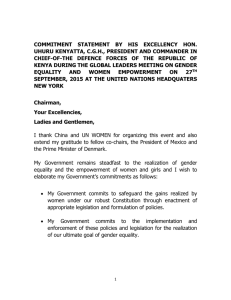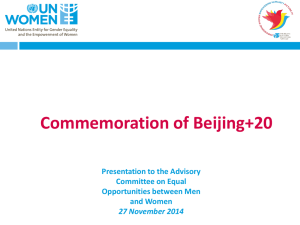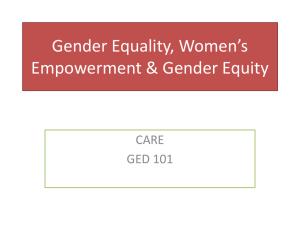here - NAWO
advertisement
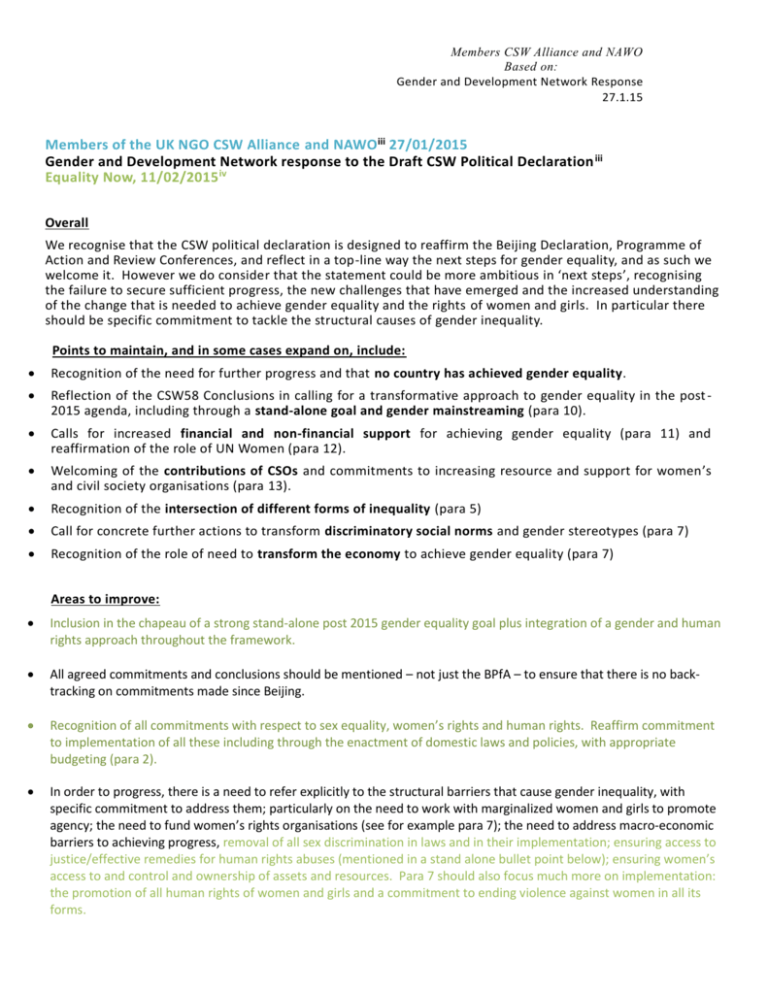
Members CSW Alliance and NAWO Based on: Gender and Development Network Response 27.1.15 Members of the UK NGO CSW Alliance and NAWOiii 27/01/2015 Gender and Development Network response to the Draft CSW Political Declaration iii Equality Now, 11/02/2015 iv Overall We recognise that the CSW political declaration is designed to reaffirm the Beijing Declaration, Programme of Action and Review Conferences, and reflect in a top-line way the next steps for gender equality, and as such we welcome it. However we do consider that the statement could be more ambitious in ‘next steps’, recognising the failure to secure sufficient progress, the new challenges that have emerged and the increased understanding of the change that is needed to achieve gender equality and the rights of women and girls. In particular there should be specific commitment to tackle the structural causes of gender inequality. Points to maintain, and in some cases expand on, include: Recognition of the need for further progress and that no country has achieved gender equality. Reflection of the CSW58 Conclusions in calling for a transformative approach to gender equality in the post 2015 agenda, including through a stand-alone goal and gender mainstreaming (para 10). Calls for increased financial and non-financial support for achieving gender equality (para 11) and reaffirmation of the role of UN Women (para 12). Welcoming of the contributions of CSOs and commitments to increasing resource and support for women’s and civil society organisations (para 13). Recognition of the intersection of different forms of inequality (para 5) Call for concrete further actions to transform discriminatory social norms and gender stereotypes (para 7) Recognition of the role of need to transform the economy to achieve gender equality (para 7) Areas to improve: Inclusion in the chapeau of a strong stand-alone post 2015 gender equality goal plus integration of a gender and human rights approach throughout the framework. All agreed commitments and conclusions should be mentioned – not just the BPfA – to ensure that there is no backtracking on commitments made since Beijing. Recognition of all commitments with respect to sex equality, women’s rights and human rights. Reaffirm commitment to implementation of all these including through the enactment of domestic laws and policies, with appropriate budgeting (para 2). In order to progress, there is a need to refer explicitly to the structural barriers that cause gender inequality, with specific commitment to address them; particularly on the need to work with marginalized women and girls to promote agency; the need to fund women’s rights organisations (see for example para 7); the need to address macro-economic barriers to achieving progress, removal of all sex discrimination in laws and in their implementation; ensuring access to justice/effective remedies for human rights abuses (mentioned in a stand alone bullet point below); ensuring women’s access to and control and ownership of assets and resources. Para 7 should also focus much more on implementation: the promotion of all human rights of women and girls and a commitment to ending violence against women in all its forms. Members CSW Alliance and NAWO Based on: Gender and Development Network Response 27.1.15 Increased resources and prioritization of resources to achieve measurable results including those set out in BPfA and any post 2015 framework (para 8). Ensure an enabling environment for NGOs to work in-country and as equal partners in UN for a etc and the protection of human rights defenders from harm (para 13). The global demographic shift to older populations is not addressed but leads to new problems and new initiatives are required both to ensure older women are included in solutions and to ensure their needs are addressed (see proposed text change in para 16) There should be recognition of the changes that have occurred most recently with expansion of conflict within and across national boundaries including by military and fundamentalist religious groups that recognize no national boundaries and the ways in which the rights of women of all ages and origins and their children, especially the girl child, are subjected to /rape as weapons of war and all forms of gender-based violence. There should be a commitment to the eradication of all forms of Violence against women and girls as both effect and further cause of inequality as well outside of conflict (see introduction sentence inserted). A paragraph is needed on discriminatory laws preventing women’s status as equal subjects under the law and equal access to justice which is not prevented by, for example, poverty (see suggestion, Para 10bis). Women and girls should not be presented as ‘vulnerable’. The language of human rights as well as empowerment should be used throughout. Girls and women of all ages should be consistently mentioned to reaffirm the commitment in the BPFA that action to further gender equality and the rights of women and girls must address women’s entire life-course. Comments on the Text Suggested additions are underlined in bold and deletions are [bracketed] Political declaration on the occasion of the twentieth anniversary of the Fourth World Conference on Women We, Heads of State and Government, ministers and representatives of Governments gathered at the fifty-ninth session of the Commission on the Status of Women in New York, on the occasion of the twentieth anniversary of the Fourth World Conference on Women, held in Beijing in 1995, in the context of the review and appraisal of the implementation of the outcomes of the Conference and of the twenty-third special session of the General Assembly, entitled “Women 2000: gender equality, development and peace for the twenty-first century”, including current challenges that affect the implementation of the Platform for Action and the achievement of gender equality, the realisation of human rights of women and girls, and the empowerment of women, as well as opportunities for strengthening gender equality and the empowerment of women in the post-2015 development agenda through a stand-alone goal on gender equality and the rights of women and girls and with transformative targets and indicators and the integration of a gender perspective across all components of the post-2015 framework; and with a commitment to eradicate all forms of violence against women and girls that both causes and results from gender inequality ensuring that the United Nations Summit for the adoption of the post-2015 development agenda, scheduled to take place from 25 to 27 September 2015, effectively contributes to the realization of gender equality, 1. Reaffirm the Beijing Declaration 1 and Platform for Action, 2 the outcome documents of the twenty-third special session of the General Assembly 3 and the declarations of the Commission on the Status of Women on the tenth and 1 Report of the Fourth World Conference on Women, Beijing, 4-15 September 1995 (United Nations publication, Members CSW Alliance and NAWO Based on: Gender and Development Network Response 27.1.15 fifteenth anniversaries of the Fourth World Conference on Women and agreed conclusions and resolutions on its implementation adopted by the Commission on the Status of Women;4 2. Recognize that the implementation of the Beijing Declaration and Platform for Action and the outcomes of its review processes and the fulfilment of the obligations under the Convention on the Elimination of All Forms of Discrimination against Women are mutually reinforcing in achieving gender equality and the empowerment of women; 3. Welcome the comprehensive review activities undertaken by Governments, the United Nations system, civil society, and other actors at national, regional and global levels on the occasion of the twentieth anniversary of the Fourth World Conference on Women and the outcomes of regional review conferences; 4. Welcome the progress made towards achieving gender equality, the empowerment of women and the human rights of women and girls through concerted policy action at national, regional and global levels and the contribution of all stakeholders; 5. Express concern that progress has been slow and uneven and that major gaps and obstacles and structural barriers remain in the implementation of the 12 critical areas of concern of the Platform for Action, and recognize that twenty years after the Fourth World Conference on Women, no country has achieved equality for women and girls, that significant levels of inequality between women and men persist, and that some groups of women and girls experience increased [vulnerability and] marginalization due to multiple and intersecting forms of discrimination and inequality including income levels, discriminating stereotypes, disability, age, geographical location, language, ethnicity, race, religion, citizenship, nationality or lack thereof, HIV status, marital status, migrant status, indigenous status, sexual orientation, gender identity or gender expression; 6. Recognize that new challenges have emerged in the elimination of discrimination against women and girls and the implementation of the Beijing Declaration and Platform for Action and the outcome documents of the twenty -third special session of the General Assembly; in particular recognise the impact of conflicts within and across state boundaries including from militarised fundamentalist religious groups which recognise no national state boundaries and commit crimes of gender-based violence against women of all ages and the girl child. 7. Reaffirm our political will to promote, protect and fulfill all human rights and fundamental freedoms of all women and girls in all their diversity and firmly commit to tackle critical remaining gaps and challenges and pledge to take concrete further actions to transform discriminatory social norms and gender stereotypes and tackle the underlying structural barriers that perpetuate gender inequality such as promoting the agency of women and girls and supporting women’s rights organisations; transform the economy to achieve gender equality and sustainable development; significantly increase investments in gender equality; ensure full and equal participation, influence and leadership of women of all ages, including from marginalized groups, in decision-making at all levels including public and private, and including in conflict and postconflict situations, and achieve gender parity; strengthen accountability, including non-state actors, for gender equality and the realization of the human rights of women and girls to ensure the full, effective and accelerated implementation of the Beijing Declaration and Platform for Action and the outcomes of the twenty-third special session of the General Assembly through laws, policies, strategies and programme activities for all women and girls. 8. Express our firm belief that gender equality, the empowerment of women and girls in all their diversity and the realisation of their human rights [of women and girls] is achievable with requisite political will, targeted action, increased allocation and prioritization of resources and social mobilization and therefore commit to achieve measurable results in achieving the goals and targets established by the Beijing Declaration and Platform for Action and the outcomes of its review conferences by 2020 and to fully realize gender equality, the empowerment of all women and girls and the human rights of all women and girls by 2030; 9. Emphasize that the full and effective implementation of the Beijing Declaration and Platform for Action the outcomes of its review processes, and the agreed conclusions and resolutions agreed by the Commission on the Status of Women, is essential for achieving the post-2015 development agenda and sustainable development goals to be 2 3 4 Sales No. E.96.IV.13), chap. I, resolution 1, annex I. Ibid., annex II. General Assembly resolution S-23/2, annex, and resolution S-23/3, annex. See Official Records of the Economic and Social Council, 2005, Supplement No. 7 (E/2005/27), chap. I.A. and E/2010/27 Members CSW Alliance and NAWO Based on: Gender and Development Network Response 27.1.15 adopted in September 2015, and that gender equality and the empowerment of women must be realized to achieve sustainable development beyond 2015; 10. Commit to ensuring that the centrality of gender equality, the empowerment of women and the human rights of all women and girls to sustainable development are addressed through a transformative and comprehensive approach and reflected in a stand-alone goal and integrated through gender-sensitive targets and indicators in all goals as well as in the means of implementation, financing and mechanisms for the review, monitoring and accountability of the post-2015 development agenda, its guiding declaration, the associated means of Implementation, financing and monitoring and review declarations. 10 bis Commit to marking the 15th anniversary of the UN Security Council resolution 1325 on Women Peace and Security with increased efforts to promote equal participation of women in all forums and peace activities at all levels, to integrate a gender perspective in the resolution of armed or other conflicts and foreign occupation, and to provide appropriate training to prosecutors, judges and other officials in handling cases involving rape, forced pregnancy in situations of armed conflict indecent assault and other forms of violence against women in armed conflicts, including terrorism. Commit to pursuing justice for all women through the removal of barriers to justice including discriminatory laws that fail to grant equal status to women and men before the law, financial barriers, and lack of training and understanding in the police, judiciary and officials within criminal justice systems especially in relation to cases of gender-based violence. 11. Commit to further strengthen and increase financial, political and technical support for institutional mechanisms for gender equality, at all levels; and to prioritize increased investment in achieving gender equality, the empowerment of women and the human rights of all women and girls, enhance resources, capacity building, data collection and monitoring, and access to and use of ICTs; and call upon all stakeholders, in all sectors and at all levels, to enhance their efforts in this regard; 12. Welcome the establishment and recognize the important role of the United Nations Entity for Gender Equality and the Empowerment of Women (UN-Women) in promoting gender equality and the empowerment of women and the central role the Entity is playing in mobilizing States, civil society, the United Nations system, the private sector and other relevant stakeholders at all levels in support of the review and appraisal of the implementation of the Beijing Declaration and Platform for Action; and encourage UN-Women to continue these efforts beyond the Beijing+20 review; 13. Welcome the major contributions made by civil society, including women’s and community-based organizations and feminist groups to the implementation of the Platform for Action and commit to increase resources and support for grass-roots, local, national, regional and global women’s and civil society organizations to advance and promote gender equality, the empowerment of women of all ages and the human rights of all women and girls; 14. Call upon the United Nations system to strengthen its efforts to achieve gender equality and the empowerment of women under all its respective mandates, including through systematic gender mainstreaming, ensuring the meaningful participation of all women and their organisations including marginalised women and girls and women’s rights organisations, resources to deliver results, and monitoring of progress with qualitative and quantitative data and robust accountability systems; 15. Commit to engaging all stakeholders and call upon them, including international and regional organizations, civil society and non-governmental organizations, the private sector, the media, trade unions, academia and research organizations, political parties, youth, as well as all women and girls, men and boys, to become part of the movement for gender equality, the empowerment of women and the human rights of women and girls and to fully commit themselves and intensify their contributions to the realization of gender equality, the empowerment of women and the human rights of women and girls; 16. Resolve to use all opportunities in 2015 and beyond in the areas of sustainable development, economic policy, peace and security, human rights, humanitarian action, and climate change as well as taking note of the global demographic shift to older populations thus requiring new, innovative policies and programmes to meet the challenge and to take historic action for irreversible progress on gender equality, the empowerment of women and the human rights of all women and girls. Members CSW Alliance and NAWO Based on: Gender and Development Network Response 27.1.15 – built on Gender & Development Network Version sent 26/01/2015. Contact: Jessica Woodroffe c/o ActionAid, 33-39 Bowling Green Lane, London EC1R 0BJ T: 020 3122 0609 E: info@gadnetwork.org.uk or Jessica.woodroffe@gadnetwork.org www.gadnetwork.org.uk i ii iii iv Comments provided by Members of the UK NGO CSW Alliance and NAWO based on version 1 provided by th e Gender and Development Network dated January 20 2015 Contact: csw-alliance@nawo.org.uk; www.nawo.org.uk For more information about the Gender and Development Network see www.gadnetwork.org Version commented on is labelled 20 th January, 2015 For more information on Equality Now, see: http://www.equalitynow.org/
